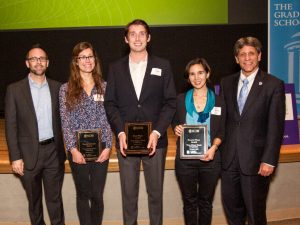
Nick Wagner, a doctoral student in psychology and neuroscience, won UNC-Chapel Hill’s first-ever Three Minute Thesis (3MT®) competition on Nov. 4.
An enthusiastic audience, including Chancellor Carol L. Folt, watched 10 doctoral students present their research on a stage, using one slide and no props other than the slide. A panel of judges assessed the participants’ ability to clearly explain the significance of their research, and their engagement with the audience, among other criteria.
The 3MT was developed by the University of Queensland, in Australia, and is now held in more than 200 universities in 18-plus countries worldwide. UNC-Chapel Hill doctoral students from a variety of disciplines participated in earlier judged preliminary rounds to advance to the final round.
Wagner, who received a $1,000 prize, advances to the regional competition at the Conference of Southern Graduate Schools in February 2016 in Charlotte.
Nicole Bauer, a doctoral student in history, was the runner-up, and Kayla Peck, a doctoral student in biology, was the People’s Choice awardee (determined by audience ballot). Both received $500 prizes.
“The 3MT has provided an opportunity to refine and practice presentation skills that will play an essential role in my job search and subsequent career path,” Wagner said. “It’s clear from the impressive presentations of each of the competitors that there is meaningful research taking place at UNC across a range of disciplines, and I thank The Graduate School for providing an opportunity to share it with our community.”
Steve Matson, dean of The Graduate School, said that the student presentations were very compelling, focusing attention on the promise of research and the important ways graduate students advance discoveries.
“Each and every day, graduate students are working to bring vital new knowledge that helps improve lives and communities throughout our world,” he added. “I think this competition has been a very valuable experience for all of the participating students because it has enhanced their ability to communicate the importance of their research to a general audience. I think it has been a valuable experience for the audiences, as they’ve heard about how graduate student research benefits our University and our world.”
Wagner said his research seeks to identify and understand how psychobiological and environmental factors interact and contribute to conduct problems and callous or unemotional behaviors in children. “This research has important implications that can inform interventions aimed at supporting families and parents in preventing later aggressive behaviors,” he added.
Bauer said her research interests include political culture, the development of ideology and the intersection of evolving concepts of honor, secrecy and transparency in 18th-century France. “I look at how, over the course of the century, attitudes toward secrecy changed as government transparency took on new importance,” she added.
Peck said her research focuses on explaining why Middle East Respiratory Syndrome (MERS) can infect bats and humans, but not mice. “To date, MERS has infected over 1,500 people with a 36 percent mortality rate and is still circulating in the population with no available drugs or vaccines,” she added. Peck is studying the virus with the ultimate goal of contributing to potential therapeutics.
Watch videos of the winning presentations»
Read more about the 3MT competition, the 10 finalists and the panel of judges…
